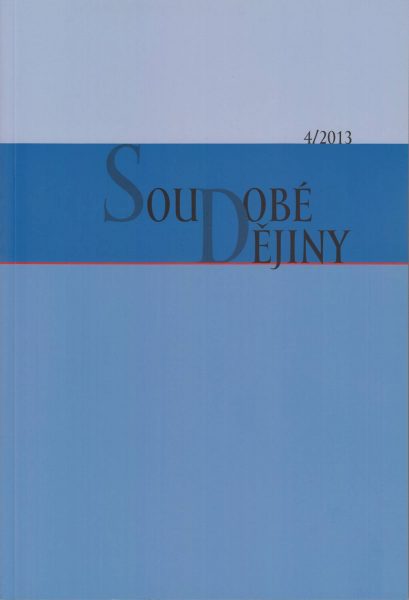Kontinuita nestejného. Sporné závěry z nesporně dobrých analýz Matěje Spurného
Continuity between Unlikes: The Doubtful Conclusions of Matěj Spurny’s Undoubtedly Good Analyses
Author(s): Karel HrubýSubject(s): Social Sciences
Published by: AV ČR - Akademie věd České republiky - Ústav pro soudobé dějiny
Summary/Abstract: In this article, the author takes issue with some of the arguments in Matěj Spurny’s Nejsou jako my: Česka společnost a menšiny v pohraniči (1945–1960) (They’re not like us: Czech society and minorities in the borderlands) (Prague: Antikomplex, 2011). The core of the book, he argues, consists in well-documented analyses of the relations between Czechs, Germans, and other groups of the population in the Bohemian borderlands after the Second World War, that is, between the central authorities and society there. He considers less convincing, however, the generalizing conclusions that are conceptually based on the international project ‘Socialism as a Thought World’ (Sozialismus als Sinnwelt), of which Spurny was a participant. Nevertheless, according to Hruby, these conclusions do not follow from the analyses in Spurny’s book. According to Hruby, Spurny’s treatment of continuity is problematic when he claims that the mentality of society after the Communist takeover, in late February 1948, was a continuation of the thinking, attitudes, and behaviours of society, whereby the principle of the ‘purge’, the use of force, and the techniques of segregation were legitimized in the three years between the end of the war and the takeover. By contrast, Hruby points to important factors of discontinuity before and after February 1948 in a number of respects, including the different dominant ideologies and ideological enemies, the different political systems, the different means of using force, the different social bases of political and social practices of persecution, the different thinking of pre-February society in the borderlands and of post-February majority society. With these arguments, he casts doubt on Spurny’s basic premise that the processes that borderland society went through after the war are the key to understanding the processes that affected society in the interior after February 1948. Hruby’s fundamental reservation is, then, that the approach represented by Spurny diminishes the extent to which the Communist Party, its leaders, and its institutions of repression were responsible for the establishment of the dictatorship and subsequent acts of oppression, and, instead, shifts this responsibility to society and its mentality. In this way, according to Hruby, historians such as Spurny are guilty of the same one-sidedness as that which they accuse the proponents of the totalitarian model of when interpreting the Communist past.
Journal: Soudobé Dějiny
- Issue Year: XX/2013
- Issue No: 04
- Page Range: 628-640
- Page Count: 13
- Language: Czech

